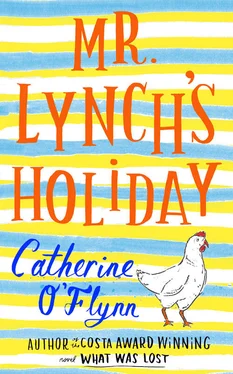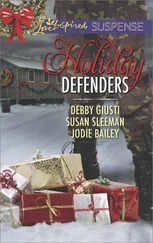In time he learned that Matty had been in England for a year, starting off in London before coming up to Birmingham. While Dermot had got his Corporation job at the recruitment office back in Dublin, Matty had emigrated with no arrangements in place. He ended up labouring, picking up work in the pubs and getting paid there too. It turned out that he boxed at the place the Dubliner had mentioned. Dermot would tag along sometimes to Riley’s, but while he was powerful he lacked Matty’s agility.
Kelly’s house was a three-storey terrace with a lingering smell of bacon. The other lodgers were older men: Devlin from Cork, who was a know-all; Aloysius Dempsey, who shook and smelled of TCP; a man named Liam Corgan, who had a budgerigar he had trained to peck crumbs from his lips; Aggie’s own brother Eddie, and countless unnamed others who stayed only days or weeks before moving on to the promise of better opportunities or lodgings elsewhere. One bed on the first floor was shared between Bernard Feeney, who worked a night shift at Lucas, and Gerry Byrne, who was a labourer.
Some nights a group of them would play cards down in the kitchen with Aggie’s husband, Michael. They played hand after hand of Twenty-Five. The stakes, at Aggie’s insistence, were just matchsticks, but Michael took it deadly seriously, lambasting anyone he felt had played poorly, blaming them for his losses. ‘You gave me a bad lead!’ he’d shout and rage, employing all manner of theatrics. No one paid much attention, except, Dermot noticed, Matty. He saw how his room-mate jumped when Michael banged the table, and caught him trembling sometimes when Michael was giving out, despite the fact he could have flattened the landlord with one lazy swipe.
Other times Dermot would go out with Matty and some of his gang to the local pubs in Sparkhill. The following day Dermot’s memories of the night before were always fragmentary, stray images lacking context — Mick Conroy with a lampshade on his head, Tim Murphy reciting a poem to nobody, someone singing a song about a lost dog, Matty sitting quietly and smiling at it all.
Dermot persuaded Matty out to a dance at St Catherine’s once, the two of them dressed up in their best clothes. They stood by the bar and looked at the women.
‘There’s a conductor I know, Brummie fella, name of Garrett. You should hear the lines he comes out with to the girls on the buses. He’s got all the chat.’
‘A loudmouth, is he?’ asked Matty.
‘A smooth talker I suppose you’d call him. Very confident, like. He’d come to a place like this on his own, wouldn’t bother him at all, he’d pick a girl he liked the look of and walk straight up to her.’
‘And what would he say?’
‘He has a line. He goes up to the girl and he says: “Would you mind pretending you know me for a moment? I have an old flame here tonight looking for me and the only way she’ll leave me alone is if I’m with a pretty girl like you.”’
Matty looked at him. ‘What about when the old flame catches up with him?’
‘There is no old flame. It’s a just a line to get the girl’s attention, make her think another girl’s interested in him.’
‘So it’s a lie.’
‘It’s a line, Matty. Just to meet someone.’
They were silent for a long time, sipping their pints.
‘So the idea is that this girl believes him and likes him?’
Dermot sighed. ‘Ah, forget about it. It was just a story about a fella from work.’
‘I know, I know, but I don’t understand.’
‘What don’t you understand?’
‘So the girl likes him and he likes the girl and they start going together, is that the idea?’
‘I suppose so, yes.’
‘And say then they get engaged and get married and maybe they go on and have six kids and grandkids and they have a long old life together and one day, the girl’s an old woman now, and she’s lying on her deathbed and she turns to the fella, this conductor, though he’s retired now too, and she says: “Whatever happened to that old flame?” What does he say to her then? How does he answer her? Does he lie again, as she’s there about to meet God?’
Dermot stared at him. Matty shook his head and returned to his pint. ‘He sounds a gobshite to me.’
Dermot was made a driver soon enough. He was teamed up with a conductor from St Kitts called Leonard Blythe. They worked the 43 route.
‘But it’s an ugly town,’ said Leonard quite frequently. ‘The people are nice enough, but the setting is inelegant. Grimy and besmirched,’ he’d gesture at the industry around them. ‘What must Mother Nature, in all her majesty, think of such abominations?’
But Dermot thought there was something wonderful about it all. The hissing and clanking of the GKN factory, the rise and fall of the gasometers, the silhouetted towers of the coke works. He’d sit at the terminus each evening, watching the sun set behind the power station. He’d think about Saturday’s dance at St Catherine’s, the next coach trip with the Irish Citizens League, the new suit he was saving for and other things beyond as he watched the white plumes above the cooling towers billow and rise up into the orange sky.
They had worked for the same company back in England. Laura edited Web-design manuals with pretensions to being coffee-table books. She spent her days clarifying the meaning of words written by men who wore shorts to work, most of whom, she discovered, collected dolls of one sort or another. Eamonn worked on computer-programming titles with astonishingly ugly covers. He once queried a jacket design and learned that the move from restrained typographic covers to large, brutal, greyscale portraits of the author’s face had single-handedly driven up sales by 200 per cent. Programmers were reassured by the faces of other programmers.
He and Laura used to debate whether programmers or designers had the more abysmal prose style. They would email each other passages of clogged, impenetrable text, a competition between them. Laura began to suspect that her own literacy was being eroded by spending each day laboriously disentangling knotted jumbles of words and punctuation marks. She worried the shattered sentences, orphaned subclauses and teetering conjunctions would start to colonize her brain and a viscous fog descend over all meaning.
As time went on there was less and less need for either of them to go in to the office, until eventually they realized that they could work remotely and live wherever they chose. They were not tempted by the quaint seaside towns of Suffolk that seemed to attract many of their colleagues, or the self-regarding buzz of Shoreditch or Brighton. Laura was drawn to the sun. Her ideal scenario was their existing life minus the nine interminable months of greyness and damp. For his part, Eamonn had no qualms about leaving England — overfamiliar and cloying, unsurprising and pleased with itself. He felt the lure of somewhere different, the promise of renewal.
Their original plan had been for one of the big cities — Barcelona or Madrid or Bilbao. They had no interest in joining the hordes of expats clustered along the Costas in vast apartment complexes and chintzy hillside developments. Eamonn saw the majority of British settlers in Spain as an amorphous mass of Daily Express readers riddled with hypocrisy: railing against benefit cheats at home while happy to avoid Spanish tax; indignant at immigration levels in the UK, but oblivious to their own immigrant status. These were people for whom Spain’s greatest cultural achievement was its tireless dedication to polished floors and gleaming kitchen worktops.
But escape was more difficult than they had anticipated. The competition for decent apartments in the overcrowded cities was fierce, and as a couple of clueless guiris , with barely any Spanish, they had no contacts or resources to call upon. It soon became clear that buying or even renting an apartment in such places was far more complicated and expensive than they had imagined. They spent a depressing two weeks in Barcelona looking at a succession of tiny apartments, with increasingly inventive layouts. Mildewed shower cubicles in the corner of bedrooms, toilets on balconies, a mezzanine bed platform suspended above the kitchen, and everywhere perky Ikea accents to mask the squalor.
Читать дальше












